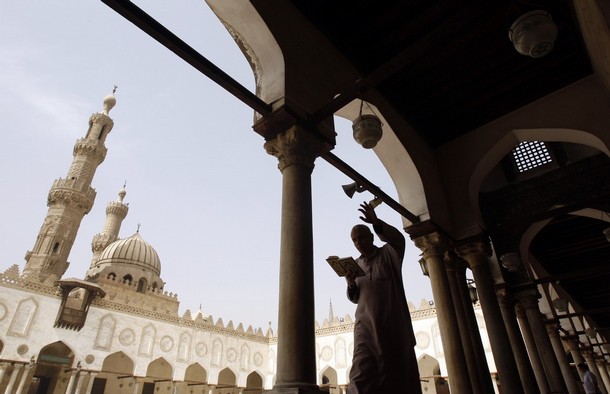
Merely tapping on the shoulders of political and religious leaders in the Muslim world and claiming that what is happening now has nothing to do with Islam simply provides all the more opportunities for extremists and terrorists to attain their goals
AMID PRESENT DAY events associated with terrorist operations carried out by Muslim extremists, it has become customary for the political leadership and opinion formers in both the East and the West – including leaders of the stature of Obama or religious figures of the stature of the Vatican Pope or the Council of Senior Scholars in Saudi Arabia or Egypt’s Al-Azhar – to claim that these acts have nothing to do with Islam and do not characterise it, but are rather acts committed by specific groups of evil men who do not represent Islam in any way whatsoever.
But this is simply to turn a blind eye to the truth of the matter. It is highly misleading since it places responsibility upon the shoulders of specific individuals of evil intent, as though their motives derived from some genetic deformity or some criminal inclination dictated by personal circumstances connected with their upbringing or their socio-economic conditions. This article therefore examines the true reasons behind the rise of extremism and terrorism, since it is a highly dangerous thing to ignore their source, and confuse in this way the accelerating advances made by mankind since the Second World War in improving the cognitive and moral system of humanity, by merely fighting the symptoms of the disease instead of pulling up the roots that produce them.
The article takes the view that religion, any religion, is made up of three principle constituents which define its distinctive features:
- a collection of sacred texts containing a set of teachings that are to be followed and respected by its adherents
- commentaries and interpretations of these texts produced by these adherents
in addition to
- practices undertaken by believers in the course of applying the faith’s teachings.
Given that the Texts are by nature fixed, while practices depend upon the believers’ understanding of those Texts, we therefore consider the two functions of commentary and interpretation to be the most important elements in determining the features that distinguish one religion from another. We consider these to be the most crucial in that they together constitute the tangible product which touches upon a person’s life. It is important to note that the functions of commentary and interpretation are purely mental functions effected via humans who vary and differ greatly in their way of thinking, and are subject to many factors and influences defining and formulating them. These factors include the surrounding political, social and economic environment, the level of intellectual and cognitive development, as well as the capacities and features of the individual commentator or interpreter.
It has become customary for the political leadership to claim that these acts have nothing to do with Islam
In light of this, it is simple enough to determine that there is no religion that is sufficiently fixed, unequivocal in its features, or with enough agreed-upon concepts for us to confine it to a written or oral vessel that we can point to as a point of reference, so as to be able to say ‘read such and such a book if you wish to know Islam’, or ‘consult such and such a person if you want an explanation of what Islam is’. Islam as a religion, for example, demonstrates an almost infinite number of complexions. Over and above the principle divisions determined by the commentary or interpretation of the foundational texts, divisions such as Sunni, Shīʽa or Sufi Islam, there are lesser denominations and schools that are themselves sub-divided, to the point that each individual has an Islam virtually unto himself! This situation is consistent with the fact that even the Qur’ān, the one and only book agreed upon by all Muslims to be perfect, has as many commentaries and interpretations to its text as the number of its multiple denominations.
Perceived in this way it is difficult, nay impossible, for anyone to claim that this religion is good or that religion is bad, unless you link this in with the actual historical moment of its origin and view the religion through this moment (evaluating how it was appropriate to that point in time with all its assumptions and variables) and define the specific interpretation and understanding that is to be examined. Just as we can charge medieval Christianity with being responsible for oppressing believers and interfering in their lives, we can respect the Christianity of today for the way it helps its adherents to achieve contentment quietly and without impinging upon others; that is, without holding against today’s Christianity the sins of its past.
Using the same logic, we can legitimately charge the Salafist understanding of Islam, which is dominating the Islamic world of today, with being responsible for drowning the world in slaughter and intimidation. For the founding principles of this understanding were, for the standards of its time, relatively peaceful during the period of the first Islamic state when it succeeded in putting paid to the phenomenon of primitive tribal fragmentation and rivalry in the Arabian Peninsula, at least raising it to a level higher than it was at the time. The interpretation prevailing in Islamic states and communities today is the Salafi (ancestral) one, both in its Sunni and Shiʽite forms, albeit in this paper we will confine our comments to the Sunni division. What is certain is that, despite the diversity and multiplicity of schools in this Sunni Salafist Islam – their main schools, subsections and branches – in very many of their basic concepts they are of one mind. This allows the researcher to deal with them as a single idea when considering the relationship of the Islamic faith, in its Sunni Salafist form, with life. We may therefore summarize the points of intersection between these schools and denominations as follows:
- In addition to being a belief system designed to explain the question of one’s existence and the relationship of mankind with his surroundings, religion hosts an integrated system of commands and prohibitions (‘rulings’ in other words) that are collected from the Qur’ān and the books of prophetic hadith and designed to deal with all the issues and challenges that life presents in almost every arena: in society, the economy, law, politics and even in medicine and the natural sciences.
- Ijtihād (independent legal reasoning) is the other supplier of rulings that address situations that the Text itself did not provide for, or to detail and clarify those that were provided. In the process of this ijtihād, and in order to arrive at the rulings, it employs a set of devices, principal among which is ijmā` (‘consensus’) and qiyās (‘analogy’). It also bases itself on a set of rules, such as the rule of “no ijtihād where there is a text” or “necessity overrides prohibition” or “the precepts are derived from the universality of the expression, not the specificity of the context” or “religious convention is paramount” and so on.
- Interpretation and ijtihād are considered to be purely technical issues to be embarked upon only by graduates of traditional religious education institutions, and permitted under terms that ensure their conformity with what is stated in the previous point.
This being the case, we can see that it is impossible to accept the idea of there being any separation between the dominant Salafi Islam and the negative manifestations that are being attributed to the Islamic religion, including the phenomena of extremism and terrorism and the clear backwardness demonstrated by the Muslim community in most aspects of life. The reason is a simple one but fundamental: in the formulation of its intellectual discourse and its political and organizational lines, the extremist and terrorist groups base themselves upon the three key starting points mentioned above which are held to be at the heart of what scholarship on the fundamentals of faith has determined.
Commentary and interpretation are the most important elements determining the features that distinguish a religion
These three rigid concepts – which inspire Saudi and Azhari preachers and others to say and act to degrade the status of women, treat them as mentally deficient, and consider their bodies so unfit for public exposure as to forbid them to drive a car in Saudi Arabia – also provide the terrorists with their inspiration for the concept of declaring others who disagree with them as ‘infidel’ and a license to shed their blood. Just as these Salafi preachers are inspired by these three concepts to prohibit people from rising up against their despotic rulers, so also do terrorists take their inspiration from them to justify their setting up of a caliphal state and their use of intimidatory methods in the exercise of politics!
A correct equation for this would be that for as long as the advocates of Salafist Islam, in all its various schools, insist on the government of the three above-mentioned pillars as representing the foundations of Islamic discourse (which they must do in order to feel reconciled to themselves and to their mindset), they have to accept the charge being levelled at them by others: that Islam (in its Salafist form, that is) is responsible for extremism and terrorism. They must also accept that they and the extremists stand on a single platform, despite the purely formal differences they might have with the extremists’ political objectives and methods!
In their attempts to rein in the hostile and waxing extremism created by Islamist radicalism, and due to moral ideals that stem from a social and political education that promotes the humanization of life in general and removes anything that would create hatred among the people, many opinion leaders and politicians in the West tend to consider these terrorists – who are now sowing destruction in every corner of the planet – to be a group of people entirely disassociated from their own religion. They also hold that the Salafist Islam adopted by the prevailing Islamist groups in the Muslim world (groups which are also present in the West) and espoused by official institutions such as the Saudi Council of Senior Scholars, the institution of Al-Azhar in Egypt and others (along with scholars and preachers brought up under their wing), is completely innocent of what they are doing.
It is my claim that this is a flabby, misleading view since it fails to identify the roots of extremism and terrorism that threaten every last cafe dotted over our vast planet! For this opinion fails to recognize an obvious reality, or even attempt to understand it, due to its being driven by an underlying fear that casting the spotlight upon it will only trigger Muslim anger and push them all the more towards hostility to modernity and to the West, without regard to the fact that the real price for this failure and negligence can only be the growth of extremism and the counter-reaction to it. It will also unfortunately promote the trend towards hatred and the renouncing of the greatest values of humanity in developed societies which have laboured strenuously (especially following the Second World War) to consolidate and propagate the values of equality, parity and peace, and the values of public and individual freedom.

Suggested Reading
Merely tapping on the shoulders of political and religious leaders in the Muslim world and claiming that what is happening now has nothing to do with Islam (by which they mean, as we have demonstrated, Islam in its Salafist form) simply provides all the more opportunities for extremists and terrorists to attain their goals, in that the intellectual foundations underlying this incubator of Islamist extremism and terrorism remain active, vigorous and persuasive. Indeed, this persistence of Islamist terrorism, as it makes light of death and vents acute psychological complexes by unloading bullets into as many ill-fated bodies as it can, has become an inspiration and an incentive also for non-Muslim western delinquents to prefer mass murder over against individual suicide, as illustrated in current media reports. Things may even get worse if other political groups adopt the same approach in dealing with rivals as an effective means to achieve goals.
So the danger now is not just terrorism. We might add another no less parlous dimension: the retrogression which advanced liberal states have begun to evidence, an overt or covert retreat from the sublime values these states have attained – the values that humankind has been looking to in order to reach its ultimate goal of consolidating the sovereignty of the people over against the rule of the despot, of helping to liberate those whose will has been usurped by the grievous oppression of political and intellectual tyrants, so that they may join the rest of the human family in building up this planet materially and morally.

Suggested Reading
This regression stems from a failure to identify the causes of the phenomenon, and this has pushed western public opinion towards imposing restrictions on those held to be threatening their very existence, let alone their values, even though these are merely wretched Muslims fleeing misery, tyranny and helplessness in their home countries, craving dignity and a means to earn a decent living. This is not to deny the existence of people in their midst who are capable of turning into a negative or destructive force, especially with the existence of mosques and Islamic centres directed by Salafi Islamists and particularly active among the youth, under the very noses of government. However, we assume that by curbing and curtailing Salafist activity, alongside some systematic programmes of enlightenment and a competent media, this will alter the picture positively enough to improve the situation in their countries of origin.
Anyone observing the position and reactions of political leaders in the West and the Middle East will see them expressing strong determination to eliminate ISIS after every terrorist attack – as if ISIS represented a state with a specific entity and recognizable personalities – in apparent disregard of its true nature as an inspirational idea with intellectual roots and connections, as opposed to an organisation whose plans and movements can be predicted. For movements such as ISIS, al-Qaeda and its ilk the concepts of soil, land or nation represent nothing more than a focal point or supply base or operations system, since as far as they are concerned such concepts in themselves have no moral or ideological value. The greatest proof of this is that the majority of those who administer the land of ‘the Islamic State in Iraq and Syria’ (ISIS), as a leadership and a base of operations, do not hail from that geographical area. They have instead gathered there from different parts of the globe and are ready to depart for any other land should the opportunity arise.
In light of all of this, any treatment of the phenomenon of Islamist extremism and terrorism must be geared towards including an intellectual component in the war against them. Betting on security and political solutions, while important in themselves, will certainly not lead to a beautiful world as long as the ideology generating these phenomena remains undefeated. The ideological war has thus become something unavoidable: the defeat of terrorism and the achievement of victory cannot be secured without resorting to this.



